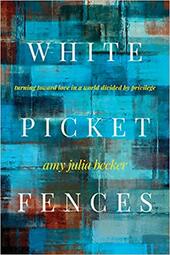Ever since reading Small Talk and A Good and Perfect Gift , I’ve been a fan of Amy Julia Becker. Because of this, I was excited to read her new book, White Picket Fences: Turning Toward Love in a World Divided by Privilege.

Amy’s book reminds her readers that “A racially stratified society harms not only the powerless but also the powerful. Any time we refuse to acknowledge the full humanity of another, we lose some of our own.”
Having recognized this, Amy explores the issue of privilege with a great deal of vulnerability and humility. As is typical of Amy’s previous books, White Picket Fences both explores a subject academically and shares Amy’s experience with it. As a fellow parent, I especially enjoyed her reflections on things like the role books play in our privilege. In Amy’s words, “I can find a lot of books with animals and a lot of books with white children, but I can’t find any books on our shelves with characters who aren’t white… According to this bookshelf, the world is monochromatic. Lions and mice are more likely to talk than children with brown skin are to have adventures and sorrows and dreams.” Seeing this made me more aware of what’s on my daughter’s bookshelf and has led me to intentionally choose library books featuring people of color.
I also appreciated White Picket Fences attempt to offer solutions for combatting and overcoming privilege. Community is one thing that Amy heralds as a solution to the problem of privilege. According to her, “The logic of self-sufficiency is a logic of loneliness.” Later, she explains, “People with no worries about their material needs have the luxury of becoming self-centered, which often means becoming self-destructive.”
In many ways, White Picket Fences is not what I expected. I expected to read a book exploring privilege as it pertains to racism and to be clear, it did. Amy’s honesty about “how easily whiteness blinds me” will also make her exploration of a difficult subject more palatable to those who are ignorant of their privilege.
Beyond the issue of race, however, White Picket Fences also explores privilege as it pertains to things like education and not having any disabilities. This awakened me to different aspects of privilege that I had previously not considered – like my own private school education. Indeed, Amy’s friend Suellen Jones explains how “Private school is one way to keep white kids going to school all together.” Amy goes on to explain, “The Supreme Court diagnosed a sickness throughout the public-school system in the South when it demanded the end of segregation. Their intended antidote to the sickness was integration. Many white people instead responded by setting up private academies not bound by the rules of the state.”
Because of how White Picket Fences challenged me to think about privilege differently, when someone recently asked me what the best non-fiction book I read in 2018 was, I was quick to name it. I have no doubt that whenever you read White Picket Fences it will quickly rise to the top of your best books list as well.
******************************************************
Disclosure: I received a free copy of White Picket Fences from the Tyndale Blog Network in exchange for a fair and honest review.